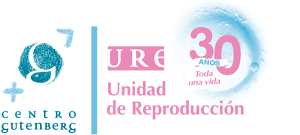When to see a fertility specialist?

Almost all couples who start trying to get pregnant ask themselves the same question: How long will it take? Or, at what point should I go to an assisted reproduction clinic if I don’t conceive naturally?
These are questions that couples will start to ask themselves over and over as the months go by and the pregnancy tests are negative.
For this reason, at URE Centro Gutenberg, an assisted reproduction clinic in Malaga, we want to make it very clear at what point you should request your first fertility appointment if you are having problems conceiving at home.
What is assisted reproduction?
First of all, we are going to explain what assisted reproduction is.
Assisted reproduction is a group of techniques, almost all of them carried out in a laboratory, which involve the handling of the female and male gametes (eggs and sperm), in order to achieve fertilisation of the egg and the subsequent pregnancy in infertile couples.
We can say that a couple is dealing with infertility if they have not conceived naturally after 12 months of regular, unprotected intercourse (2 to 3 times a week).
These techniques are also used by single mothers and same‑sex female couples who wish to start a family.
Reasons to make an appointment with an assisted reproduction clinic.
The age of the female is a determining factor when it comes to fertility, and we are all aware that as a society we are increasingly delaying motherhood.
Our current pace of life, little to no work‑life balance, the difficulty in finding a partner… mean that the average age of patients who go to specialised assisted reproduction clinics has gone up over the last ten years. For example, at URE Centro Gutenberg the average age of our patients is currently about 38 years old.
But age is not the only factor. There may also be other issues which are making it difficult to have children, problems that may or may not have been detected earlier.
We are going to answer these and other questions so that you know for sure when there are enough reasons for you to put yourself in the hands of the best specialists in assisted reproduction.
Maternal age
The best age for childbearing for females is close to 20 years old. Fertility gradually declines starting at the age of 30, and it especially begins to fall after the age of 38.
To give you an idea, the odds of getting pregnant each month you try at the age of 30 are around 20%.
However, at the age of 40 this percentage falls drastically to 5% for each cycle, and if you are 45 years old or older the likelihood of conceiving is almost zero.
When you’ve been having regular, unprotected intercourse for a year
To find out if you have a fertility issue you will first have to try to get pregnant naturally, right? To do this, specialists recommend having unprotected intercourse 2 to 3 times a week.
According to data from the Spanish Fertility Society (SEF), approximately 25% of couples get pregnant after the first month of having regular, unprotected intercourse, 85% conceive after one year and 90% conceive after two years.
For this reason, it is advisable to go to a fertility clinic and undergo a basic fertility study if you have unsuccessfully been trying to conceive for one year. If you are over the age of 35, you should go after trying for 6 months.
Ovulation problems
Many women deal with ovulation problems due to hormone imbalances that prevent the ovaries from functioning normally.
This may be your case if your ovulation is irregular or if you do not ovulate at all (for example, in cases of polycystic ovaries).
You can tell if you are ovulating regularly if your menstruations are regular. If you are dealing with ovulatory issues and you want to get pregnant, consult a fertility specialist.
Blocked fallopian tubes
Having damaged or blocked fallopiantubes is one of the most common problems we see at fertility clinics because it is practically impossible to conceive naturally if you have this problem.
The most important causes of blocked fallopian tubes often include pelvic inflammatory disease, sexually transmitted infections and sterilisation surgeries. Fortunately, In Vitro Fertilisation treatment makes pregnancy possible in cases of tubal blockages.
In this article we will talk more about blocked fallopian tubes and how we can determine whether you have this issue.
Endometriosis
Endometriosis is a condition that affects approximately 10% of the female population during their childbearing years and is very closely related to infertility.
We can define endometriosis as the growth of endometrial tissue (the tissue found on the inner walls of the uterus), found outside of the uterus, causing adhesions and other problems in other organs of the female reproductive system (ovaries, fallopian tubes, etc.).
It is a very common condition and is quite uncomfortable in some cases due to the discomfort it causes, but fortunately it can be easily treated.
If you suspect you may have endometriosis, put yourself in the hands of a good fertility specialist to achieve your pregnancy.
To continue reading more about endometriosis, click here.
Uterine fibroids
A uterine fibroid is a benign tumour that is common among women, but which can sometimes complicate fertility.
The relationship between fibroids and fertility is disputed, and there are many clinical debates that have arisen around this topic. However, if you know you have fibroids and you aren’t able to conceive naturally, see a fertility specialist.
In this article we will talk to you more about uterine fibroids and when their removal is indicated in order to achieve pregnancy.
Sperm factor
It always takes two people to have a child. We need two cells: an egg cell and a sperm cell. And not all fertility issues are always associated with the female: in fertility, the male also matters.
Sperm quality declines as males age, although not as evidently as with egg quality in females. The decline in male fertility occurs much later in life, and it doesn’t become a problem until males reach the age of about 50 or 60.
With age, sperm morphology (shape) and motility (movement) tend to decrease. In addition, there is a slightly increased risk of genetic defects in sperm the older a male is.
On the other hand, if your partner underwent a vasectomy in the past, it is important that you know that it is possible to get pregnant through in vitro fertilisation using a testicular biopsy to retrieve the sperm.
Does one of these situations sound like your case?
You haven’t been able to get pregnant after some time trying.
Don’t wait any longer and get in touch with us.
At the Centro Gutenberg Reproduction Unit we have 35 years of experience in reproductive medicine.
We will be happy to help you and to help make your dream of becoming a parent come true.

